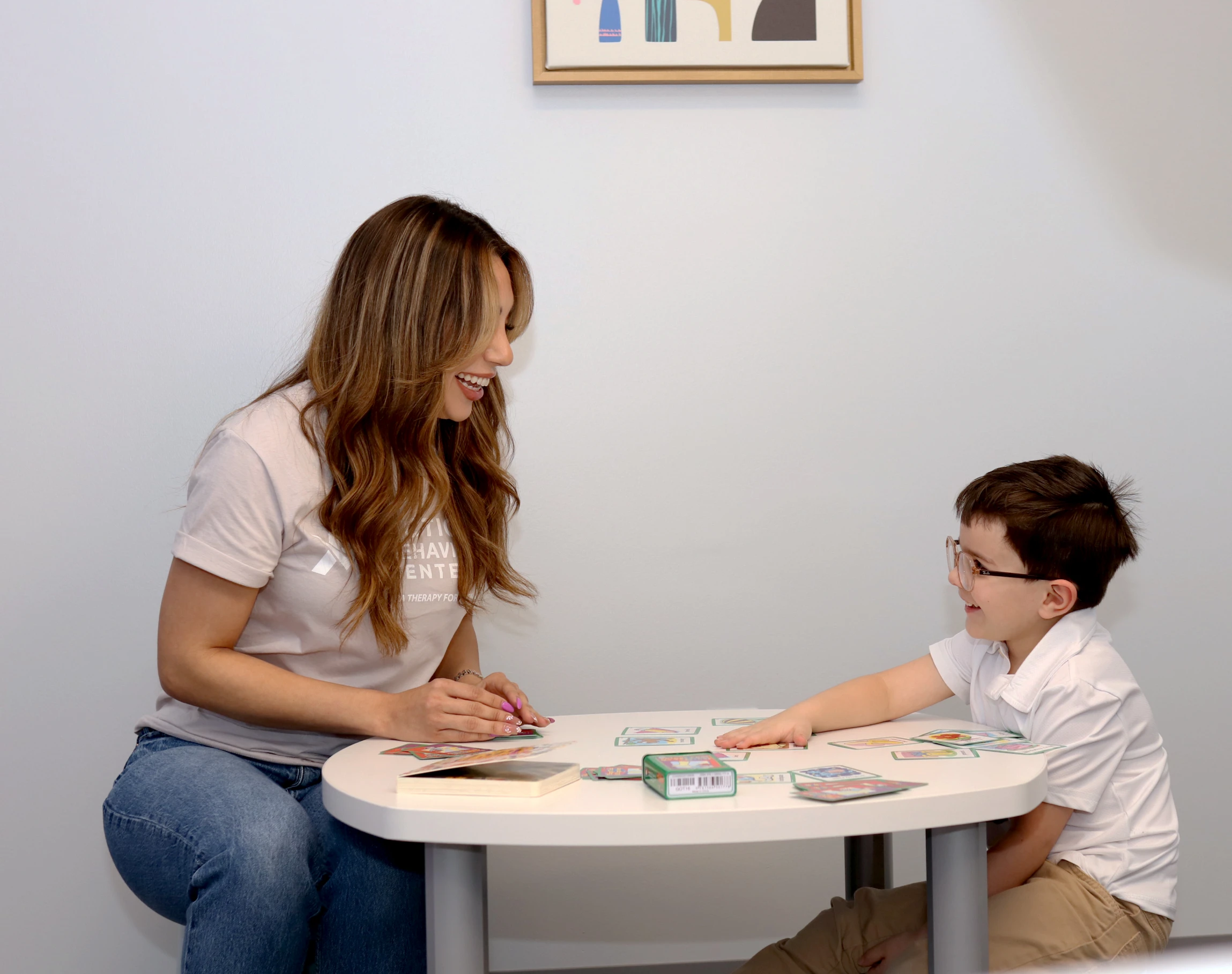Initial Diagnostic Evaluation: Autism diagnostic support
At Action Behavior Centers, we provide expert diagnostic support for families who may be wondering if their child could have autism spectrum disorder (ASD). Our Initial Diagnostic Evaluations (IDEs) are designed to evaluate for ASD in young children ages 18 months through 6 years. They are conducted in select cities by licensed psychologists either in-center or via telehealth.

Families love working with Action Behavior Center

Our son has made outstanding progress during the last year, he is finally coming out of his shell and engaging in open play with other children. Thank you so much ABC for helping us!


Very happy with ABC and all the therapists. They are all so sweet and nice, always willing to help in any way they can. My son loves going to "school" everyday and loves his therapists so much. I always leave with a peace of mind knowing they are taking good care of him and as a parent, that is the most important thing. We are so lucky to be part of the ABC family. I cannot recommend this place enough, absolutely happy with everyone here.

What is an Initial Diagnostic Evaluation (IDE)?
There is no single test that can diagnose autism spectrum disorder. Instead, clinicians use a variety of methods to determine whether a child meets the criteria for ASD as outlined in the Diagnostic and Statistical Manual of Mental Disorders, Fifth Edition (DSM-5). An IDE at ABC is focused in scope to evaluate specifically for autism; it does not assess for all possible childhood diagnoses.
- The evaluation typically begins with a parent interview, where caregivers share information about their child’s medical history, developmental milestones, and daily behaviors.
- This is followed by direct observation, where the psychologist engages the child in interactive activities to see how they communicate, play, and respond in real time.
- Autism specific tools are also used to gather useful information regarding behaviors associated with autism.
- Once the evaluation is complete, families participate in a results review session. During this meeting, the psychologist explains the findings, discusses whether the child meets criteria for a diagnosis of autism, and provides individualized recommendations for next steps. Families also receive a written diagnostic report that can be shared with their pediatrician, teachers, or other providers to guide future care.

Who can complete an IDE?
Children are often referred for an IDE after completing an autism screener like the M-CHAT-R or CAST, or if concerns arise at a pediatrician visit.
For children with multiple or complex developmental conditions, a more extensive diagnostic evaluation may be recommended. If this is the case, we can connect families with providers who offer comprehensive assessments.
What does an IDE measure?
An Initial Diagnostic Evaluation examines the key areas of development that are closely related to autism, including:

1. Social communication
Clinician observes how a child uses eye contact, gestures, and facial expressions, and whether they share enjoyment or interest with others during interactions.

2. Play and imagination
The assessment looks at how a child engages with toys, participates in pretend or imaginative play, and builds simple stories or scenarios.
_2.webp)
3. Language and communication
Clinician assesses both expressive skills, such as talking, asking questions, and responding to others, and receptive skills, like understanding and following directions.

4. Restricted or repetitive behaviors
The clinician notes any repeated movements, intense interests, or sensitivities to changes in routines or environments.

5. Emotional responses
Clinician observes how a child manages transitions, handles frustration, and reacts to unexpected changes or new experiences.

What tools are used during an IDE?
Not every child will need every tool. Our psychologists choose the ones that best fit your child’s age, history, and needs. These tools help support the diagnostic process and guide treatment recommendations.
This includes directly administered tools such as the Autism Diagnostic Interview-Revised, Autism Diagnostic Observation Schedule, Childhood Autism Rating Scale, and the Tele-ASD-Peds. Related parent questionnaires are also used.
Where are IDEs performed?
IDEs are offered in select cities via telehealth and in-center. No matter the setting, our evaluations follow best practices for the evaluation of autism and include a developmental interview with the caregiver(s), direct assessment of the child, and incorporation of other sources of information, such as questionnaires or related records.
At-home via telehealth or in-person
Families can choose to complete the IDE virtually, allowing the child to be observed in a familiar and comfortable environment. This provides the opportunity for a natural observation of behaviors and interactions between the child and caregiver. The psychologist will coach the caregiver through simple activities while they watch for key behaviors.
Some families prefer an in-person evaluation. This structured setting allows the psychologist to guide activities while observing the child’s responses directly. Parents are encouraged to take part in parts of the assessment and play an active role by completing parent-report measures.
Contact us to learn more about what autism assessment services are offered in your area!

_2.webp)
Does insurance cover an IDE?
We bill insurance for IDEs and check insurance coverage prior to scheduling. Parents can check if we provide IDEs for their specific insurance plan by calling one of our offices. Please contact a local center to learn more about what insurance we work with in your state.
What happens after an IDE?
After the evaluation, families meet with the clinician for a feedback session. During this meeting, you will receive:
- A detailed diagnostic report with test results and clinical observations
- Diagnostic insights explaining whether your child shows characteristics of autism
- Individualized recommendations for next steps, which may include applied behavior analysis (ABA) therapy, speech therapy, occupational therapy, or other interventions, depending on the diagnosis made.
At your request, Action Behavior Centers can share this report with your child’s pediatrician or other providers to support referrals, school planning, and ongoing care.
Getting started with an Initial Diagnostic Evaluation (IDE)

Does an IDE diagnose autism?
The IDE helps evaluate whether autism is present or not. If a child meets full diagnostic criteria, a diagnosis of autism is provided. If the child does not meet the criteria for an autism diagnosis, alternative diagnoses might be provided along with tailored recommendations.
Why is early autism diagnosis important?
Early diagnosis opens the door to early intervention, which has been shown to improve long-term outcomes. Many therapies, including applied behavior analysis therapy, require a formal diagnosis for insurance coverage.
What’s the difference between an IDE and the ADOS-2?
At Action Behavior Centers, we offer two types of autism assessments to help families take the next step toward answers and support.
An IDE is completed by a licensed psychologist. It includes developmental history, behavioral observations, and standardized assessments to determine whether a child meets criteria for autism spectrum disorder. IDEs include diagnostic results and individualized recommendations for next steps in care. These evaluations are offered in select ABC cities and are billed to insurance plans accepted by ABC.
ABC also offers Autism Diagnostic Observation Schedule, Second Edition (ADOS-2) assessments conducted by trained clinicians. The assessment is completed at one of our centers, and results are faxed to the child’s pediatrician or specialist for review. The ADOS-2 provides very useful information that the child’s doctor can incorporate into their evaluation for autism. This service is offered at no cost as a community benefit to help pediatricians identify autism earlier and connect families with care faster, especially in areas where formal evaluations may have long waitlists.
Because ABC services vary by state, we encourage families to contact us to learn which assessments are available in their area.
ABA therapy: Evidence-based autism treatment
ABA therapy is considered a gold standard in autism treatment. It uses positive reinforcement and individualized strategies to help children build practical skills they can use in daily life. At ABC, Board Certified Behavior Analysts® (BCBAs®) and Registered Behavior Technicians® (RBTs®) work closely with families to help children reach meaningful outcomes.
At Action Behavior Centers, we’ve seen firsthand how early diagnosis and EIBI change lives. Our own outcomes data show that:
- Children who complete services with ABC are more likely to thrive in general education classrooms. Most graduates spend the majority of their school time in general education settings. In contrast, children who leave services prematurely often remain in special education or alternative placements.
- Families report reduced stress after starting ABA. In the first year of treatment at ABC, parents share that their stress levels go down, especially those who began therapy feeling the most overwhelmed.
- Challenging behaviors decrease significantly. In our research, children ages 2–6 experienced an 86% reduction in unsafe behaviors like aggression, property destruction, and elopement. These improvements were strongest in the first year of care and continued even as therapy hours gradually decreased.
Ready to get started?
Action Behavior Centers is here to help guide you through the diagnostic process so your child can access the care they need, when they need it. Complete our brief online interest form, and a teammate will contact you to discuss your child’s needs at no cost.
FAQs about Initial Diagnostic Evaluations
What can we expect during an IDE?
The process is designed to be as comfortable as possible for your child. It typically includes:
- Parent interview – You’ll share details about your child’s development, daily life, and any concerns you’ve observed.
- Parent questionnaires – Families may complete standardized tools such as the Autism Diagnostic Interview–Revised (ADI-R), Behavior Assessment System for Children (BASC-3), or Autism Spectrum Rating Scales (ASRS).
- Child observation and testing – The psychologist will observe your child’s play, communication, and social interactions using specialized tools such as the Childhood Autism Rating Scale (CARS-2), ADOS-2, or Tele-ASD-PEDS.
Who can benefit from an IDE?
IDEs are best suited for children ages 18 months to 6 years who show developmental concerns or early “red flags” for autism. If your child has multiple or complex developmental needs, a more comprehensive evaluation may be recommended.
What happens after the IDE?
The psychologist who completes the IDE will schedule a feedback appointment to go over results and recommendations. A written report will also be provided. At your request, we can send the report to other providers to support planning and next steps.
Do you offer virtual autism evaluations?
Yes. We offer flexible evaluation settings to meet each family’s needs:
- At-home via telehealth – Virtual evaluations allow your child to be observed in their familiar home environment, where natural behaviors are often easiest to see.
- In-center – Some families prefer an in-person evaluation at an Action Behavior Center, where the psychologist can guide activities in a structured setting. These are offered in select states.
Our psychologists are trained to adapt if challenges arise during the process. If your child has difficulty participating or if disruptions occur, the psychologist can reschedule, complete follow-up observations, or use additional measures to ensure accurate results.
Why is it important to get an autism diagnosis?
A formal diagnosis is often required for children to access therapies such as ABA, speech, or occupational therapy. It may also be necessary for school services and insurance coverage. Early diagnosis opens the door to early intervention, which has been shown to improve long-term outcomes.


